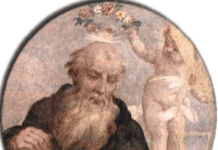How old was Lazarus? Robert Browning, in a poem written in 1855—An Epistle Containing the Strange Medical Experience of Karshish, the Arab Physician—suggests that he would have been about ten years old. We learn from the poem that Karshish is touring the Near East in A.D. 70 as a student of medicine, sending back in a series of letters to his master, Abib, what he has been able to discover, including, e.g., “Three samples of true snakestone—rarer still,/One of the other sort, the melon-shaped.” In the course of his travels he visits Bethany, where he encounters Lazarus, then a man of fifty.[1] That would make him ten years old in A.D. 30, which is the date Jesus brought him back to life. Indirect evidence for this view can be found in the Gospel of Luke, which states that “a woman named Martha received Jesus into her house.”[2] It seems, then, to have been a household managed by women, with little Lazarus dependent on his older sisters.
In the first century Arab medicine, however primitive by modern standards, was much admired and resorted to. Karshish represents the sceptical, scientific mind, interested and intrigued by the story of a man raised from the dead. In the poem, as in the Gospel, Lazarus himself never speaks, although during the interview he is surrounded by town folk eager to answer Karshish’s queries:
Some elders of his tribe, I should premise,
Led in their friend, obedient as a sheep,
To bear my inquisition. While they spoke,
Now sharply, now with sorrow,—told the case,—
He listened not except I spoke to him,
Karshish begins by accounting for the event in strictly rationalistic terms:
’Tis but a case of mania—subinduced
By epilepsy, at the turning-point
Of trance prolonged unduly some three days.
In other words, Lazarus, having come to after having been in a coma, was under the delusion that he had died and been miraculously restored to life by Jesus, “a Nazarene physician of his tribe.” Soon, however, Karshish is struck by an extraordinary sensitivity he observes in Lazarus:
Heaven opened to a soul while yet on earth,
Earth forced on a soul’s use while seeing heaven:
The man is witless of the size, the sum,
The value in proportion of all things,
Or whether it be little or be much. . . .
Wonder and doubt come wrongly into play,
Preposterously, at cross purposes.
As Browning describes him, Lazarus may be indifferent to what impresses most people, but he is not apathetic:
Contrariwise, he loves both old and young,
Able and weak, affects the very brutes
And birds—how say I? flowers of the field—
As a wise workman recognizes tools
In a master’s workshop, loving what they make.
The reason for this seeming indifference or distraction on the part of Lazarus is the fact that he lives continually in the presence of Jesus:
And oft the man’s soul springs into his face
As if he saw again and heard again
His sage that bade him “Rise” and he did rise.
The effect is to make him completely, almost stoically, resigned to God’s will. “
Indeed the especial marking of the man
Is prone submission to the heavenly will—
Seeing it, what it is, and why it is.
The climax of the poem comes in the last few lines when the still-sceptical Karshish confesses to his fascination with Lazarus’s conviction that in Jesus God had made himself available to mankind in human form:
The very God! think, Abib; dost thou think?
So, the All-Great, were the All-Loving too—
So, through the thunder comes a human voice
Saying, “O heart I made, a heart beats here!
Face, my hands fashioned, see it in myself!
Thou hast no power nor mayst conceive of mine,
But love I gave thee, with myself to love,
And thou must love me who have died for thee!”
The madman saith He said so: it is strange.
The poem is a meditation on life and death, in the form of the behaviour of a man who lives in the light of eternity:
He holds on firmly to some thread of life— . . .
The spiritual life around the earthly life:
The law of that is known to him as this,
His heart and brain move there, his feet stay here.
When I preached this as a sermon a few years ago in the chapel of a small Catholic college, I left the congregation with an assignment, viz., to depict, if not in a poem then in prose, how they would have imagined the risen Lazarus: a mystic? an activist? a bishop? married or celibate? Such an exercise would reveal what we think of the effect of Jesus Christ in our lives, for in baptism each of us has ben resurrected from the death of sin into new life: “I am the resurrection and the life; he who believes in me will never die.”[3] This promise is as valid for us as it was for Lazarus. And so, what do you make of the mysterious figure of Lazarus?a
[1] “The man—it is one Lazarus a Jew,/Sanguine, proportioned, fifty years of age . . .”
[2] Lk 10.38.
[3] Jn 11.25.











